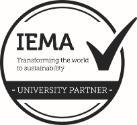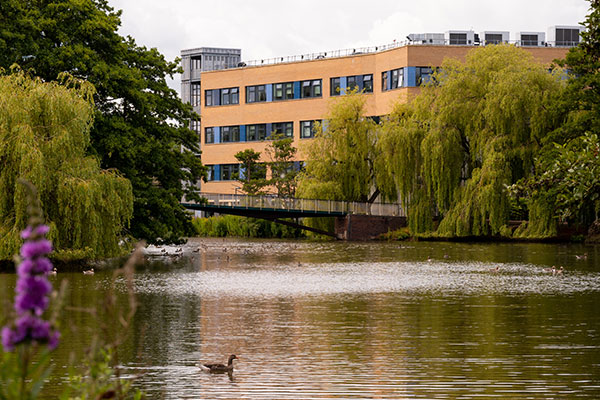
MSc Sustainable Business: Leadership, Innovation and Management
From classroom to boardroom: lead in sustainable business.
Year of entry: 2026 (September)
The world faces a complex web of sustainability crises that demand a new generation of leaders. Business as usual is no longer an option. The MSc in Sustainable Business: Leadership, Innovation and Management is designed for those who want to lead this change.
Grounded in a problem-based learning approach, our curriculum moves beyond theory to immerse you in the real-world challenges businesses confront. You will develop the practical skills to design and implement effective change management strategies , foster innovation, and create resilient solutions for a sustainable future.
Through our teaching, you'll gain expertise in independent and critical thinking. You'll have opportunities to work with external organisations, allowing you to apply your skills to real-world problems.
With dedicated placement support you'll be able to make the most of the opportunities open to you. Our careers and employability support extends after graduation, helping you to shape your career.
On graduation, you'll be well-placed for roles in internationally oriented companies, public institutions and organisations that strive for sustainability.
Accreditation

MSc Sustainable Business: Leadership, Innovation and Management is accredited by the Institute of Environmental Management and Assessment (IEMA), the professional body for everyone working in environment and sustainability.
Course content
The course structure will equip you with the skills and knowledge needed to undertake an independent academic or applied sustainable business project. You'll gain multidisciplinary knowledge, including business functions and theories of organisational, sustainability (environmental, social and economic) and justice (social, environmental).
You'll develop skills in project design and implementation. You'll learn how to design and implement effective change management strategies including how to assess, improve and monitor the sustainability of an organisation. Through the group project you'll gain the experience of collaboration with an external organisation committed to sustainable business.
The programme has four streams or specialist pathways which allow you to tailor your degree to your personal or employment interests. Students have the choice of following one of these streams by undertaking the corresponding optional modules or conversely selecting modules from different streams if they so wish. The four streams are:
- Environmental Management; for students seeking a specialisation in sustainable environmental management. Corresponding modules: Environmental Management in Practice (Semester 1); Climate Science and Policy (Semester 2).
- Sustainable innovator; for students seeking a specialisation in innovative sustainable business practices. Corresponding modules: Sustainable Innovation and Entrepreneurship (Semester 1); Alternative Economies and Sustainable Business (Semester 2).
- Sustainability Strategist; for students seeking a specialisation in sustainability policy practices. Corresponding modules: Sustainable Innovation and Entrepreneurship (Semester 1); Finance and Environmental Sustainability (Semester 2).
- Sustainability leadership; for students seeking a specialisation in sustainability thought leadership Corresponding modules: Sustainable and Just Futures (Semester 1); Alternative Economies and Sustainable Business (Semester 2).
Modules
Core modules:
- Introduction to Sustainable Business and Corporate Sustainability
- Change Management for Sustainability
- Group Sustainability Business Project
- Research Skills and Methods
Optional modules:
Our modules may change to reflect the latest academic thinking and expertise of our staff, and in line with Department/School academic planning.
Dissertation
As part of your core modules, you will need to complete either a Dissertation or Dissertation with Placement.
Learning outcomes
Every course at York is built on a distinctive set of learning outcomes. These will give you a clear understanding of what you will be able to accomplish at the end of the course and help you explain what you can offer employers. Our academics identify the knowledge, skills, and experiences you'll need upon graduation and then design the course to get you there.
Learning outcomes for this course
- Discuss the scientific principles which underlie sustainability problems, and critically assess and debate their solutions in the context of business
- Analyse complex sustainability problems using theories, concepts, models and methods from a range of disciplines
- Conduct advanced research to inform change management planning and the development of sustainable solutions in the private and public sector
- Identify areas of focus and priorities for change towards sustainability which take into consideration the context in which they are working (organisational, regional, national and international)
- Design and implement effective change management and innovation strategies to assess, improve and monitor the sustainability of an organisation
- Collaborate effectively and professionally within and across organisations and develop partnerships using face-to-face and online approaches
- Design innovative and resilient solutions to sustainability problems linked to business which consider the linkages between environment, society and economy, risk and uncertainty
- Communicate effectively and professionally across disciplines for specialist and non-specialist audiences using written, oral and digital media
Fees and funding
Annual tuition fees for 2026/27
| Study mode | UK (home) | International and EU |
|---|---|---|
| Full-time (1 year) | £13,900 | £31,900 |
| Full-time (1 year) | £13,900 | £31,900 |
Fees information
UK (home) or international fees? The level of fee that you will be asked to pay depends on whether you're classed as a UK (home) or international student. Check your fee status.
Find out more information about tuition fees and how to pay them.
Funding information
Discover your funding options to help with tuition fees and living costs.
We'll confirm more funding opportunities for students joining us in 2026/27 throughout the year.
If you've successfully completed an undergraduate degree at York you could be eligible for a 10% Masters fee discount.
Funding opportunities
Chevening Scholarships
We are pleased to work with Chevening Scholars to offer funding for our Masters programmes. Chevening Scholarships provide one year of fully-funded postgraduate study in the UK for international (including EU) students. The scholarships are open to early and mid-career professionals who have the potential to become future leaders.
Other cost considerations
If you are interested in the exchange option, you should consider the implications for:
- University accommodation – we will aim to be flexible on contract length; please indicate early that this might be an option
- Shorter private accommodation – contracts that enable release at six months
- Visa requirements
Travel and accommodation for the conference will be covered.
Teaching and assessment
Teaching format
Throughout the course, there is a strong focus on project work and developing your change management skills.
The two semesters are taken up by taught modules. Programme teaching comprises a mix of lectures, seminars and workshops taught face to face as well as independent group work and private study.
At the start of the group project, you'll select a broad project idea from a list compiled in collaboration with business partners.
To support project development and implementation, you'll have two-hour workshops in the first two weeks of the module and 2-hr group meetings with staff alongside separate 1-hour weekly meetings with business partners.
For your independent project, you'll have regular one-hour meetings with the academic supervisor and business partner (if undertaken as placement).
Facilities
Our state-of-the-art building contains purpose-built labs, lecture theatre and seminar rooms.
Teaching location
You will be based in the Department of Environment and Geography on Campus West.
About our campus
Our beautiful green campus offers a student-friendly setting in which to live and study, within easy reach of the action in the city centre. It's easy to get around campus - everything is within walking or pedalling distance, or you can always use the fast and frequent bus service.
Assessment and feedback
All the modules you take will be assessed, and we employ a variety of forms of assessment, including:
- Change management plan
- Reflective writing
- Poster presentation
- Policy, analysis and case study reports
- Teamworking
- Participation and contribution
- Essays
- Articles for a professional but non specialist audience
Your individual project will be assessed on a dissertation based on an assessed Dissertation Proposal completed in Semester 2.
Careers and skills
On graduation, you'll be well-placed for roles in internationally oriented companies, public institutions or (non-governmental) organisations that are committed to international agreements and strive for sustainability.
Career opportunities
- Sustainability manager
- Environmental consultant
- Supply chain analyst or manager
- Policy officer
- Civil Service fast streamer
- Think tank researcher
- Sustainability related positions linked to marketing, product-design or outreach
Transferable skills
- Time management and people skills
- Critical thinking and evaluation
- Analytical and technical research skills
- Comparison and correlation of disparate data
- Theoretically/methodologically informed decision making
- Communication to multiple and distinct audiences
- Teamwork
Entry requirements
| Qualification | Typical offer |
|---|---|
| Undergraduate degree | 2:2 or equivalent in any discipline or with relevant professional experience. |
| Other international qualifications | Equivalent qualifications from your country |
English language
If English isn't your first language you may need to provide evidence of your English language ability. We accept the following qualifications:
| Qualification | Minimum requirement |
|---|---|
| IELTS (Academic and Indicator) | 6.5, minimum 6.0 in each component |
| Cambridge CEFR | B2 First: 176, with 169 in each component |
| Oxford ELLT | 7, minimum of 6 in each component |
| Oxford Test of English Advanced | 136, minimum 126 in each component |
| Duolingo | 120, minimum 105 in all other components |
| LanguageCert SELT | B2 with 33/50 in each component |
| LanguageCert Academic | 70 with a minimum of 65 in each component |
| Kaplan Test of English Language | 478-509, with 444-477 in all other components |
| Skills for English | B2: Merit overall, with Pass with Merit in each component |
| PTE Academic | 61, minimum 55 in each component |
| TOEFL | 87, minimum 21 in each component |
| Trinity ISE III | Merit in all requirements |
For more information see our postgraduate English language requirements.
If you haven't met our English language requirements
You may be eligible for one of our pre-sessional English language courses. These courses will provide you with the level of English needed to meet the conditions of your offer.
The length of course you need to take depends on your current English language test scores and how much you need to improve to reach our English language requirements.
After you've accepted your offer to study at York, we'll confirm which pre-sessional course you should apply to via You@York.
Next steps
Contact us
Get in touch if you have any questions
Discover York







